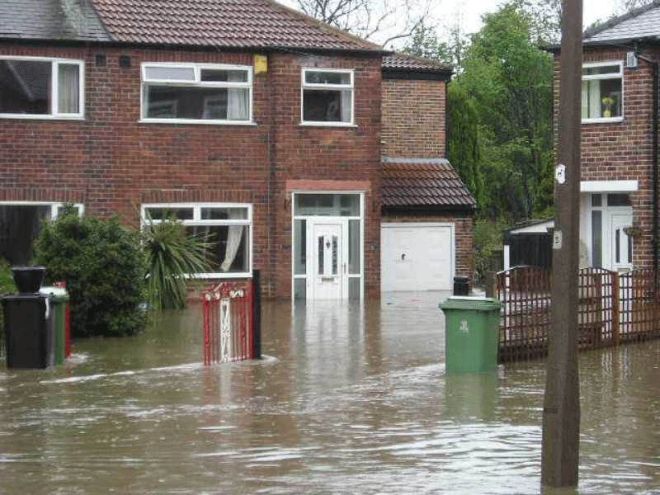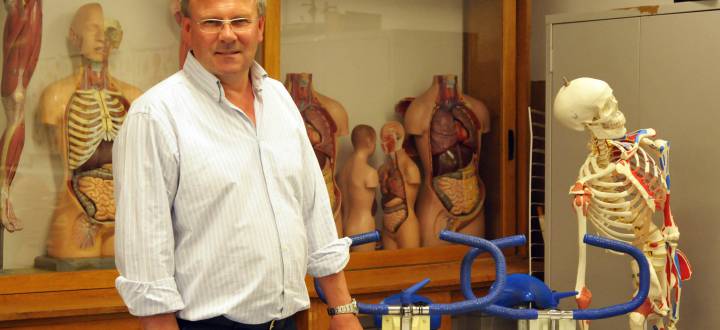Promoting flood resilience among small businesses and households
People who know they live or work in areas of high flood risk rarely take any precautions to protect their homes and businesses - even when they know, from experience, how damaging flooding can be. Dr Tim Harries researches this phenomenon and advises the Department for Environment, Food and Rural Affairs (Defra) and the Environment Agency on how to improve the take-up of measures that can reduce the loss, disruption and ill-health floods can cause householders and small businesses.
 Dr Harries' research suggests that a major problem is lack of faith in the available means of providing protection from floods, such as flood resistant barriers, and a resulting fear that the use of untested and potentially unreliable measures will increase anxiety rather than reduce it. These circumstances, he argues, prompt people to repress their awareness of the risk instead of taking steps to reduce it; as a result, flood risk becomes ignored and invisible.
Dr Harries' research suggests that a major problem is lack of faith in the available means of providing protection from floods, such as flood resistant barriers, and a resulting fear that the use of untested and potentially unreliable measures will increase anxiety rather than reduce it. These circumstances, he argues, prompt people to repress their awareness of the risk instead of taking steps to reduce it; as a result, flood risk becomes ignored and invisible.
Mitigating flood danger through unfamiliar means
The importance of familiarity and perceptions of social norms are key themes in Dr Harries' research. For example, insurance is normal and familiar, so people are often happy to rely on it for the mitigation of flood risk even though it does little to protect them from the disruption caused by a flood and normally only reimburses a portion of the financial losses incurred. Similarly, although sandbags are relatively ineffective, their use is so strongly associated with floods that they remain the most favoured means of flood protection. For many individuals and small businesses other ways of mitigating the danger caused by floods are too unfamiliar to be considered reliable. They also carry the risk of embarrassment, if they prove not to be effective, and stigmatisation.
Dr Harries argues that risk professionals are less able to promote flood protection measures effectively if they fail to recognise these influences on public behaviour and practice. Such professionals are usually trained to focus on the physical and material aspects of floods and flood damage. Consequently, they find it hard to recognise and respond to the very real and significant social and emotional barriers that hinder protective action.
Normalising new approaches to flood protection
 Dr Harries' research suggests that to reduce the anxiety associated with property-level flood protection measures, these measures need to be normalised. People are less anxious about taking an unfamiliar measure if their neighbours are also doing so. Shared use of protection measures reinforces the social solidarity that is also important to the resilience of high-risk communities. Such measures should therefore be promoted to groups of householders and small businesses rather than just to individuals.
Dr Harries' research suggests that to reduce the anxiety associated with property-level flood protection measures, these measures need to be normalised. People are less anxious about taking an unfamiliar measure if their neighbours are also doing so. Shared use of protection measures reinforces the social solidarity that is also important to the resilience of high-risk communities. Such measures should therefore be promoted to groups of householders and small businesses rather than just to individuals.
Governments still, in many instances, use engineering to reduce the likelihood of floods posing a threat to homes and businesses. However, as climate change causes flood risk to increase and spread, this approach is becoming less environmentally and economically sustainable. It is therefore increasingly important that ways are found to encourage householders and businesses, in areas of high flood risk, to actively engage with the issue of protecting themselves, their families, their properties and their livelihoods. In collaboration with colleagues from the University of the West of England and business people in Gloucestershire, Dr Harries is developing an interactive digital tool that aims to do just that for the UK's small businesses. Using digital storytelling, social networking, on-line videos and other techniques, this tool will encourage engagement with practical adaptation to flood risk amongst groups of small businesses. It will achieve this by promoting discussion and reflection, normalising adaptation and offering a gateway to information resources elsewhere on the web.
Research on flood risk is just one example of the work on behaviour change by Dr Harries and the Behaviour & Practice Research Group at Kingston. Its work also includes domestic energy consumption and healthy lifestyles.
Find out more about Dr Tim Harries on his staff profile page.
Contact us
- For non-student research enquiries, email the Research Office
- Research contacts
- Graduate Research School contacts
- Business and Enterprise contacts
- How to get to Kingston University
Contact us
- For non-student research enquiries, email the Research Office
- Research contacts
- Graduate Research School contacts
- Business and Enterprise contacts
- How to get to Kingston University


